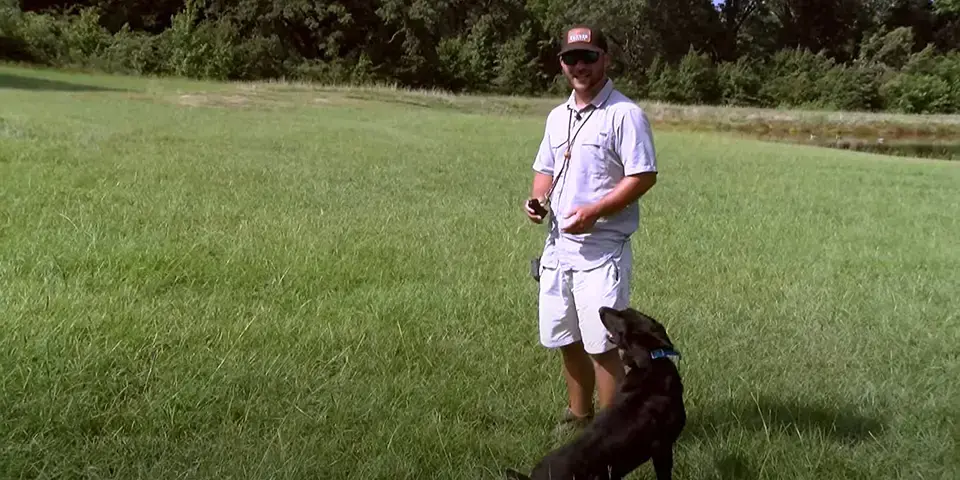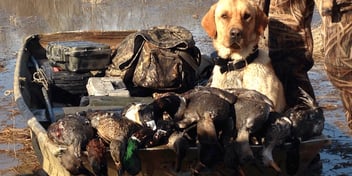
Do you ever have trouble training your hunting dog? How to train a duck dog is not easy, and sometimes even the best duck dogs develop bad habits.
In this video for duck dogs, Lawson Barker, co-founder of Red River Retrievers in Texarkana, Arkansas, walks you through what to do when your retriever develops the habit of "popping."
Lawson shows you how Gus, a Black Labrador male, overcame popping in his training as a duck dog retriever.
Transcript:
Good, good dog! Heel!
Popping
So what popping is - that's an aspect in training where a dog stops and looks back at the handler. Popping could be because of confusion, it could be just strictly from a dog's lack of training, they could be transitioning into blind retrieves. So what we're going to do is show you how we get over that aspect here at Red River Retrievers.
Bumpers
I’m going to explain a couple different tips to you that you can use at home, that will really help your dog in building confidence. So in this hand I have an orange two-inch bumper. In this hand I’ve got a three-inch white bumper. And there’s a big difference between these two. One, just from physical size. The three-inch bumper is going to be a lot easier for your dog to see. So if you’re trying to build confidence, the quicker your dog can see this bumper, the faster your dog’s going to finish that retrieve and become successful. Doing these drills, I want to use three-inch white bumpers for that aspect. Two-inch orange bumpers are not going to be near as good for your dog, because they’re going to have to get a lot closer to that pile of bumpers and therefore it takes a little while longer for the dog to get there and to become successful in that retrieve.
Bumper Pile
The reason why we have multiple bumpers out here in one location, is we want to repeat this process. So the dog might make this same retrieve six to eight different times, all depending upon how he progresses. What I want to do is walk up here confidently with my dog, him look out in the field, and drive on command. So that's what I'm looking for here.
Gus the Popper
We have a younger dog here now – his name is Gus – and he’s just in that phase of training where he’s transitioning to the field out of all the drill work into cold blinds. When you start cold blinds with dogs, this is when popping will surely arise, and we’re going to show you how to fix that here.
Good. You better go out there and pop.
Assistant: When have we ever said that before?
Come on. Sit. Sit. Sit. Down. Good. Back!
Alright. That’s what we consider a pop. You see when I put my hand down and I send him on back, he was unsure on where to go. So he just slowly left, and finally got to the point where he completely stopped and turned around and looked back at me, the handler.
Assistant: That’s perfect. That dog looks super sheepish.
Yeah. Which is not – that’s not what we want, by any means, right? I mean – sometimes it’s just part of it though. So you can see here, this dog’s confidence level is extremely, extremely low. We have no visual sighters for him in the field, we’ve completely pulled the pole, so he has no idea where to go. So at home this is what I would do. I would move up closer to that pile of bumpers to simplify the retrieve and make sure that he’s successful.
Down. Good. Good. Back!
(Gus pops)
I was afraid of that.
Here. Sit. Sit. Good! Down. Good. Back!
Alright, perfect. You see he wasn’t extremely confident, but he didn’t pop and he finished the retrieve all by himself.
So you can see his line was not perfectly straight to that pile of bumpers, but I didn’t blow a whistle for one very, very important reason. I didn’t want to break down his desire to retrieve. So by letting him deviate his line to that pile of bumpers, we built confidence by not stopping his forward momentum.
Too many times we see guys overuse their whistle. And what I mean by that is as soon as that dog deviates on that line by just a foot, they stop that dog and use the whistle there. And what you’re doing – you’re breaking down that dog’s momentum to drive and to be successful. These dogs have to be successful in order to learn and to keep their spirits up.
Good, good dog!
About the Author




